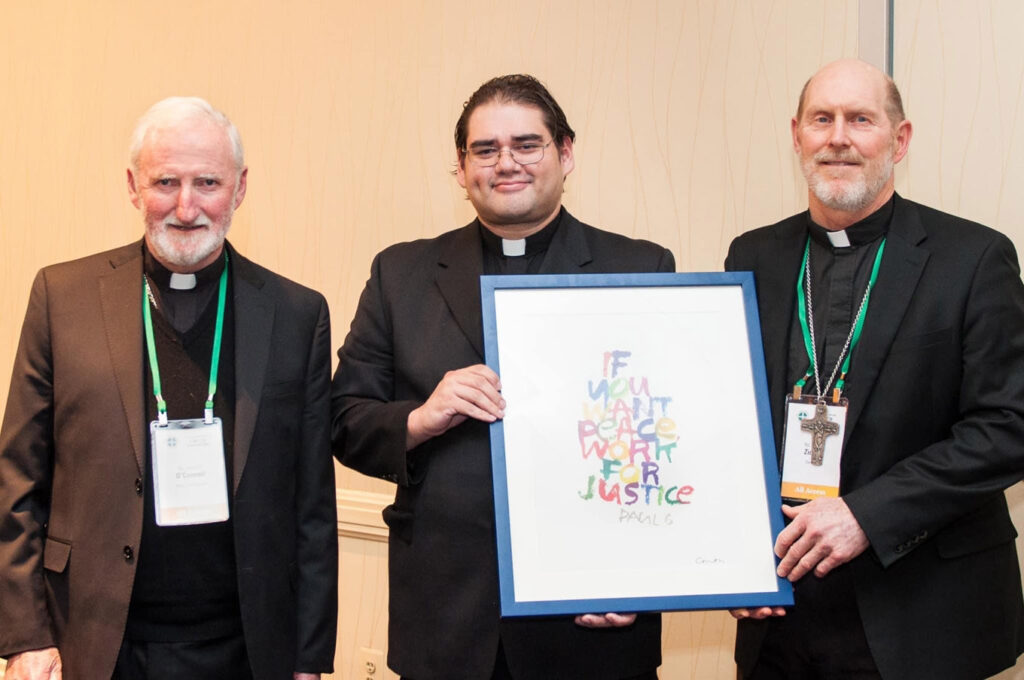
By Father Guillermo Trevino
The following was part of my homily Sunday, Feb. 19, inspired by the Gospel reading from Matthew (5: 38-48) about loving one’s enemies. Also the focus on perfection, like the heavenly Father. In seminary, we were reminded that a priest is to imitate Christ, which is no easy thing. The inspiration for celibacy is from the example of Jesus, who was not married. In my first Mass as a priest, the pastor at my home parish, St. Mary in Moline, Illinois, emphasized this point, looking at me during his homily and saying I am to be an “alter Christus,” another Christ. It has always bugged me because I am not perfect. However, Matthew’s Gospel and homily I share with you point to the perfection to which God calls us.
The book turned play turned movie, “Les Misérables,” by Victor Hugo is considered one of the greatest works ever written. Jean Valjean is a great hero and an amazing character but before all that is his beginning. Jean Valjean was a criminal who after prison found it very hard to make ends meet. Searching for a place to stay, he asks to stay at Bishop Myriel’s home. At night, Jean Valjean, tries to steal some silverware and leave. Bishop Myriel hears him and asks, “Is anyone there?” Panicking, Jean Valjean strikes the bishop and runs away. Later, police find Jean Valjean in the woods and he claims that Bishop Myriel gave him the items.
The police bring Jean Valjean to Bishop Myriel’s residence, ask the bishop about the bump on his forehead and tell him that Jean Valjean claims to have received the silverware. Rather than verifying the police’s suspicions, he does something unexpected that changes everything. Bishop Myriel says that he gave Jean Valjean the items and is pleased that he brought them back because he left early. “You forgot the candlesticks!” Made of pure silver, these items are so valuable, several thousand dollars in 19th century France, imagine what they would be worth today! Jean Valjean is in tears, the handcuffs removed. Bishop Myriel tells him, “But remember this, my brother. See in this some higher plan. You must use this precious silver to become an honest man. By the witness of the martyrs, by the passion and the blood, God has brought you out of darkness, I have bought your soul for God.”
This is such a great example of perfection and intelligence that many in 19th century France, after the French Revolution, could not believe it involved a cleric. Margaret Oliphant, a Scottish novelist and historical writer, wrote in “The Contemporary Review” that the portrait of Bishop Myriel is the “keynote of the wonderful tale.” It is the salvation of Jean Valjean from the power of evil. “It is the redemption of a soul; it is the struggle, first of the dominating sin with the dim risings of a better life.”
Kathryn M. Grossman describes Bishop Myriel’s work in transforming the lives of the poor as a moral “investment.” His “fraternal demeanor thus corresponds to an economy marketing in souls.” She continues: “By his theft, Jean Valjean shows that he is still chained to hatred and anger; by his generosity, Myriel operates a spiritual purchase that substitutes goodwill, gentleness, and peace — in other words, ‘God’— for this satanic mentality. While Christ alone can redeem with the sacrifice of his life, his bishop can perform an equally effective exchange. In divesting himself of his silver, Myriel invests in Valjean. All he demands of the recipient is that he prove worthy of the promise that he could not have made in his prison of sin, but that he will have made following his liberation. Sublime fiction opens the way to a higher truth.”
The Catholic writer Theresa Malcolm says that after Valjean leaves, “Bishop Myriel never again appears in the story, but he is the soul of the novel, he who sowed love where there was hatred, light where there was darkness.”
I ended my homily with a challenge from the Gospel to love our enemies and to let them know that they forgot the candlesticks. Then, Sunday morning, right before 8 a.m. Mass in Columbus Junction, I learned of Bishop David O’Connell’s death. He was an auxiliary bishop of Los Angeles who chaired the U.S. Conference of Catholic Bishops’ Subcommittee on the Catholic Campaign for Human Development. He was the bishop that introduced me for the 2022 Cardinal Bernardin New Leadership award.
Deacon Kent Ferris and I were shaken by the announcement. Deacon Ferris leads the Diocese of Davenport’s Social Action Office and oversees the CCHD collection in our diocese. I told the gathering about Bishop O’Connell’s death and his story in my homily. LA authorities are treating the shooting death as a homicide.
Bishop O’Connell was an advocate for the poor and in my opinion would not like the bad to outweigh the good. Bishop O’Connell was a real life “Bishop Myriel” and a great witness of helping others. May we continue to love, as our Gospel says. Love our enemies and give them our candlesticks on the road to perfection.
(Father Guillermo Trevino is pastor of St. Joseph parishes in West Liberty and Columbus Junction. He is also chaplain of Regina Catholic Education Center in Iowa City.)









